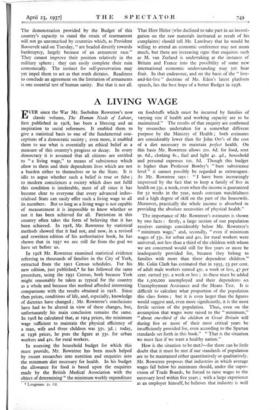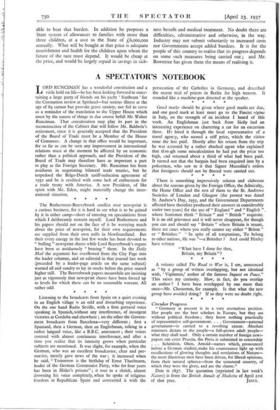A LIVING WAGE
EVER since the War Mr. Seebohm Rowntree's now classic volume, The Human Needs of Labour, first published in 1918, has been a blessing and an inspiration to social reformers. It enabled them to give a statistical basis to one of the fundamental con- ceptions of a democratic society ; even more, it enabled them to use what is essentially an ethical belief as a measure of this country's progress or decay. In every democracy it is assumed that all citizens are entitled to " a living wage," to means of subsistence which allow to them and their dependents lives which are not a burden either to themselves or to the State. It is idle to argue whether such a belief is true or false ; to modern consciences a society which does not fulfil this condition is intolerable, most of all since it has become clear to everyone that every advanced indus- trialised State can easily offer such a living wage to all its members. But so long as a living wage is not capable of measurement it is impossible to know whether or not it has been achieved for all. Patriotism in this country often takes the form of believing that it has been achieved. In 1918, Mr. Rowntree by statistical methods showed that it had not, and now, in a revised and rewritten edition of his authoritative book, he has shown that in 1937 we are still far from the goal we have set before us.
In 1918 Mr. Rowntree examined statistical evidence referring to thousands of families in the City of York, extracted from the 191 1 Census schedules. For his new edition, just published,* he has followed the same procedure, using the 1931 Census, both because York might reasonably be taken as typical for the country as a whole and because this method afforded interesting comparisons with the results obtained in 1918. Since then prices, conditions of life, and, especially, knowledge of dietetics have changed ; Mr. Rowntree's conclusions have had to be altered in view of these changes, but, unfortunately his main conclusion remains the same. In 1918 he calculated that, at 1914 prices, the minimum wage sufficient to maintain the physical efficiency of a man, wife and three children was 35s. 3d. ; today, at 1936 prices, he puts the figure at 53s. for urban workers and 415. for rural workers.
In assessing the household budget for which this must provide, Mr. Rowntree has been much helped by recent researches into nutrition and enquiries into the minimum diet necessary for health. In his budget the allowance for food is based upon the enquiries made by the British Medical Association with the object of determining " the minimum weekly expenditure * Longmont; 2s. Ed. on foodstuffs which must be incurred by families of varying size if health and working capacity are to be maintained." The results of that enquiry are confirmed by researches undertaken for a somewhat different purpose by the Ministry of Health ; both estimates are considerably lower than Sir John Orr's of the cost of a diet necessary to maintain perfect health. On this basis Mr. Rowntree allows 20S. 6d. for food, rent 9s. 6d., clothing 8s., fuel and light 4s. 4d., household and personal expenses los. 8d. Though this budget is higher than Professor Bowley's " bare subsistence level " it cannot possibly be regarded as extravagant. As Mr. Rowntree says : " I have been increasingly impressed by the fact that to keep a family of five in health on 53s. a week, even when the income is guaranteed for 52 weeks in the year, needs constant watchfulness and a high degree of skill on the part of the housewife. Moreover, practically the whole income is absorbed in providing the absolute necessities of physical health."
The importance of Mr. Rowntree's estimates is shown by two facts : firstly, a large section of our population receives earnings considerably below Mr. Rowntree's " minimum wage," and, secondly, " even if minimum wages of 53s. for urban and 41s. for rural workers were universal, not less than a third of the children with whom we are concerned would still for five years or more be inadequately provided for, because they belong to families with more than three dependent children." Mr. Colin Clark has estimated that in 1935, 23 per cent. of adult male workers earned 45s. a week or less, 47 per cent. earned 55s. a week or less ; to these must be added the 1,500,000 unemployed and their dependents on Unemployment Assistance and the Means Test. It is difficult to calculate what proportion of the population this class forms ; but it is even larger than the figures would suggest and, even more significantly, it is the most fertile section of the population. Thus, even on the assumption that wages were raised to the " minimum," " about one-third of the children in Great Britain will during five or more of their most critical years be insufficiently provided for, even according to the Spartan standards set forth in this book." " That is the situation we must face if we want a healthy nation."
How is the situation to be met?—for there can be little doubt that it must be met if our standards of population are to be maintained either quantitatively or qualitatively. Mr. Rowntree proposes that industries in which average wages fall below his minimum should, under the super- vision of Trade Boards, be forced to raise wages to the necessary level within five years ; with a large experience as an employer himself, he believes that industry is well able to bear that burden. In addition he proposes a State system of allowances to families with more than three children, at a cost to the State of L6,000,000 annually. What will be bought at that price is adequate nourishment and health for the children upon whom the future of the race must depend. It would be cheap at the price, and would be largely repaid in savings in sick- ness benefit and medical treatment. No doubt there are difficulties, administrative and otherwise, in the way. Industry may not submit voluntarily to increased costs nor Governments accept added burdens. It is for the people of this country to realise that its progress depends on some such measures being carried out ; and Mr. Rowntree has given them the means of realising it.











































 Previous page
Previous page